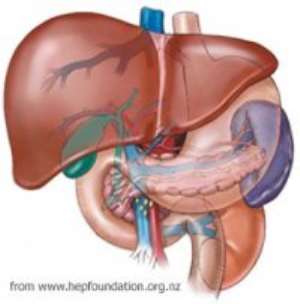
Ghana needs a national strategy on liver health as the country records an upsurge in hepatitis B infection.
This is according to the Save Your Liver Foundation (SYLiF), a non-governmental organization, which has been engaging the Health Ministry to fashion out a policy to contain the disease.
The call comes as a new survey by the Pharmaceutical Council of Ghana revealed about four million Ghanaians have hepatitis.
Hepatitis B is the most common serious liver infection. It is said to be 100 times more contagious than HIV-AIDS, yet it can be prevented with a safe and effective vaccine.
The SYLiF has been organizing free screening and offering prevention and treatment options for carriers and non-carriers of hepatitis B in parts of the country.
President of the NGO, Nyaaba-Aweeba Azongo, is advocating a national surveillance on hepatitis B to determine the prevalence rate across the country.
He is hoping the Ministry of Health will look through documents submitted by the Foundation to initiate a policy on liver health to save lives.
He noted non-availability of funds should not be cited as reason for the country's inability to create general awareness on liver health.
“At times when it is even crucially important to focus on a particular area of health, they will tell you that we don't have funding and if there is no funding arrangement from any donor partners and even if it's killing us, there are no funds. But life is precious, we need to preserve the nation's human resources to be able to develop”, Mr. Azongo told Luv News.
The Foundation has established offices across the country and engaged volunteers to embark on public education, information and communication on issues relating to the liver.
Mr. Azongo called for media support to increase public awareness on hepatitis and other liver-related diseases.
Hepatitis B can be transmitted through direct blood-to-blood contact, unprotected sex, non-sterile instruments and an infected mother passing it to her newborn during birth.
Story by Kofi Adu Domfeh/Luv Fm/Ghana




 We’ll no longer tolerate your empty, unwarranted attacks – TUC blasts Prof Adei
We’ll no longer tolerate your empty, unwarranted attacks – TUC blasts Prof Adei
 Bawumia donates GHc200,000 to support Madina fire victims
Bawumia donates GHc200,000 to support Madina fire victims
 IMF to disburse US$360million third tranche to Ghana without creditors MoU
IMF to disburse US$360million third tranche to Ghana without creditors MoU
 Truck owner share insights into train collision incident
Truck owner share insights into train collision incident
 Paramount chief of Bassare Traditional Area passes on
Paramount chief of Bassare Traditional Area passes on
 Two teachers in court over alleged illegal possession of BECE papers
Two teachers in court over alleged illegal possession of BECE papers
 Sunyani: Victim allegedly shot by traditional warriors appeals for justice
Sunyani: Victim allegedly shot by traditional warriors appeals for justice
 Mahama vows to scrap teacher licensure exams, review Free SHS policy
Mahama vows to scrap teacher licensure exams, review Free SHS policy
 Government will replace burnt Madina shops with a new three-story, 120-store fac...
Government will replace burnt Madina shops with a new three-story, 120-store fac...
